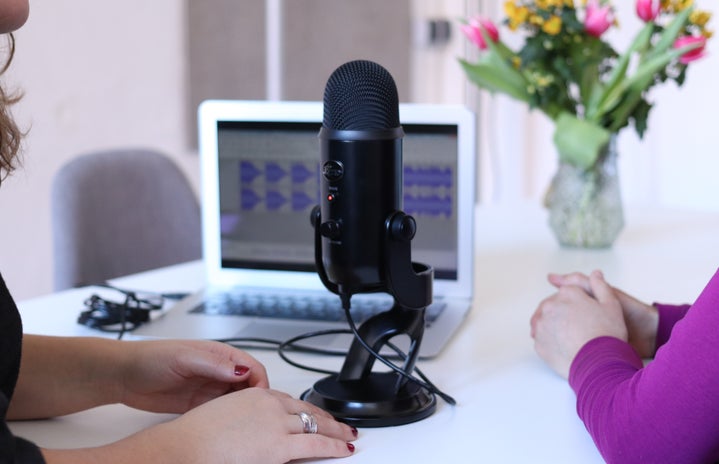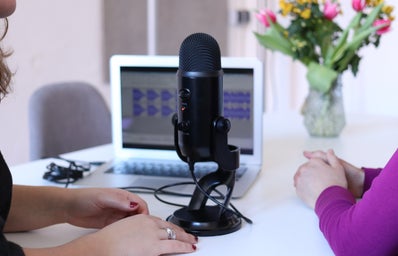By Samantha Keating
Emilia O’Neill and Kyla Guilfoil are both sophomore interns at the Lasallian Women Gender Resource Center (LWGRC). They are two driven and empowered women that work hard to provide awareness and justice on a variety of issues, mostly ones pertaining to women. It was Emilia’s initiative that made a podcast possible this semester. In collaboration with our chapter of Her Campus Emilia wanted to produce a special podcast episode surrounding eating disorders.
TW: Talk of eating disorders.
I was granted the opportunity to sit in on the pair’s recording and gained a wonderful insight into their thoughts on the topic. Kyla’s initiative at the center surrounds eating disorders and helping people who suffer from disordered eating to find the support they need. She spoke on her own personal experience with her eating disorder. Relaying that for herself as an athlete her eating disorder stemmed from deeper issues. She began swimming when she was 12, practicing for 7 days a week and 3 hours a day.
She was a child being led to believe that putting her body through such turmoil was okay. The struggle to keep pushing limits became addictive, as it does for many people. The same can be true for many athletes. Our society rewards athletes for pushing themselves to extreme and dangerous limits. But it’s not just athletes, social media and the media in general cause detrimental effects to many lives. In Kyla’s case, her eating disorder stemmed not only from athletic pressure but from household trauma. She was in an abusive household that caused her to develop a need for control. Many people with eating disorders are battling with an internalized struggle that leads to addiction and dependence on their eating disorder.
The work Kyla is doing at the LWGRC is so important because of the growing numbers of people of all ages, genders, and races that do suffer from an eating disorder. Eating disorders do not fit in a one size fits all box. They are individual to each person and their own experiences. Part of the issue with eating disorders is the stigma around them. When they are depicted and talked about it is usually as a joke, like how comedies tend to make fun of and minimize the issue of teen girls who are bulimic, usually romanticizing the situation. The severity of eating disorders is not nearly highlighted enough, which is why the work of Kyla, Emilia, and the members of the LWGRC team deserves recognition. Kyla is very dedicated to doing research about eating disorders. She not only raises awareness but provides resources to those who suffer from an eating disorder and who love someone who has an eating disorder. Last spring she published her findings in the handbook for the LWGRC, available at the center and on their website. Kyla’s story is inspiring to all, whether personally affected by an eating disorder or not. She was able to find herself again through her struggle and able to put together a variety of resources to help others. Her main piece of advice to those who have a loved one struggling with an eating disorder is to utilize and make the person aware of their resources, but more importantly to remain a constant in that person’s life, offering support and stability. Her words of wisdom for those struggling with an eating disorder is that while finding yourself again is hard it is not impossible. There is more to life than limiting yourself and your body. Kyla and Emilia describe healing as a holistic approach, as recovery means healing both your mind and your body.
While the journey to healing may be strenuous it is completely worth it and not impossible. You are not defined by your struggles. If you or someone you know is struggling with an eating disorder please consider utilizing resources for help.
- NEDA- National Eating Disorder Awareness, https://www.nationaleatingdisorders.org/where-do-i-start-0
- ANAD- National Association of Anoxeria Nervosa and Associated Disorders, https://anad.org/get-help/eating-disorders-helpline/


